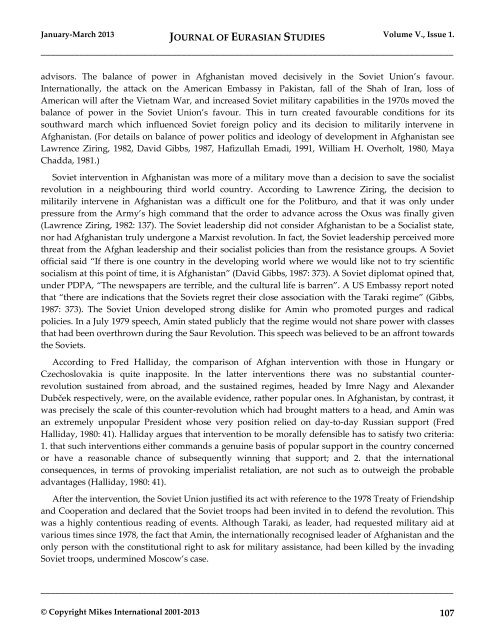JOURNAL OF EURASIAN STUDIES Journal of the Gábor Bálint de ...
JOURNAL OF EURASIAN STUDIES Journal of the Gábor Bálint de ...
JOURNAL OF EURASIAN STUDIES Journal of the Gábor Bálint de ...
You also want an ePaper? Increase the reach of your titles
YUMPU automatically turns print PDFs into web optimized ePapers that Google loves.
January-March 2013 <strong>JOURNAL</strong> <strong>OF</strong> <strong>EURASIAN</strong> <strong>STUDIES</strong> Volume V., Issue 1.<br />
_____________________________________________________________________________________<br />
advisors. The balance <strong>of</strong> power in Afghanistan moved <strong>de</strong>cisively in <strong>the</strong> Soviet Union’s favour.<br />
Internationally, <strong>the</strong> attack on <strong>the</strong> American Embassy in Pakistan, fall <strong>of</strong> <strong>the</strong> Shah <strong>of</strong> Iran, loss <strong>of</strong><br />
American will after <strong>the</strong> Vietnam War, and increased Soviet military capabilities in <strong>the</strong> 1970s moved <strong>the</strong><br />
balance <strong>of</strong> power in <strong>the</strong> Soviet Union’s favour. This in turn created favourable conditions for its<br />
southward march which influenced Soviet foreign policy and its <strong>de</strong>cision to militarily intervene in<br />
Afghanistan. (For <strong>de</strong>tails on balance <strong>of</strong> power politics and i<strong>de</strong>ology <strong>of</strong> <strong>de</strong>velopment in Afghanistan see<br />
Lawrence Ziring, 1982, David Gibbs, 1987, Hafizullah Emadi, 1991, William H. Overholt, 1980, Maya<br />
Chadda, 1981.)<br />
Soviet intervention in Afghanistan was more <strong>of</strong> a military move than a <strong>de</strong>cision to save <strong>the</strong> socialist<br />
revolution in a neighbouring third world country. According to Lawrence Ziring, <strong>the</strong> <strong>de</strong>cision to<br />
militarily intervene in Afghanistan was a difficult one for <strong>the</strong> Politburo, and that it was only un<strong>de</strong>r<br />
pressure from <strong>the</strong> Army’s high command that <strong>the</strong> or<strong>de</strong>r to advance across <strong>the</strong> Oxus was finally given<br />
(Lawrence Ziring, 1982: 137). The Soviet lea<strong>de</strong>rship did not consi<strong>de</strong>r Afghanistan to be a Socialist state,<br />
nor had Afghanistan truly un<strong>de</strong>rgone a Marxist revolution. In fact, <strong>the</strong> Soviet lea<strong>de</strong>rship perceived more<br />
threat from <strong>the</strong> Afghan lea<strong>de</strong>rship and <strong>the</strong>ir socialist policies than from <strong>the</strong> resistance groups. A Soviet<br />
<strong>of</strong>ficial said “If <strong>the</strong>re is one country in <strong>the</strong> <strong>de</strong>veloping world where we would like not to try scientific<br />
socialism at this point <strong>of</strong> time, it is Afghanistan” (David Gibbs, 1987: 373). A Soviet diplomat opined that,<br />
un<strong>de</strong>r PDPA, “The newspapers are terrible, and <strong>the</strong> cultural life is barren”. A US Embassy report noted<br />
that “<strong>the</strong>re are indications that <strong>the</strong> Soviets regret <strong>the</strong>ir close association with <strong>the</strong> Taraki regime” (Gibbs,<br />
1987: 373). The Soviet Union <strong>de</strong>veloped strong dislike for Amin who promoted purges and radical<br />
policies. In a July 1979 speech, Amin stated publicly that <strong>the</strong> regime would not share power with classes<br />
that had been overthrown during <strong>the</strong> Saur Revolution. This speech was believed to be an affront towards<br />
<strong>the</strong> Soviets.<br />
According to Fred Halliday, <strong>the</strong> comparison <strong>of</strong> Afghan intervention with those in Hungary or<br />
Czechoslovakia is quite inapposite. In <strong>the</strong> latter interventions <strong>the</strong>re was no substantial counterrevolution<br />
sustained from abroad, and <strong>the</strong> sustained regimes, hea<strong>de</strong>d by Imre Nagy and Alexan<strong>de</strong>r<br />
Dubček respectively, were, on <strong>the</strong> available evi<strong>de</strong>nce, ra<strong>the</strong>r popular ones. In Afghanistan, by contrast, it<br />
was precisely <strong>the</strong> scale <strong>of</strong> this counter-revolution which had brought matters to a head, and Amin was<br />
an extremely unpopular Presi<strong>de</strong>nt whose very position relied on day-to-day Russian support (Fred<br />
Halliday, 1980: 41). Halliday argues that intervention to be morally <strong>de</strong>fensible has to satisfy two criteria:<br />
1. that such interventions ei<strong>the</strong>r commands a genuine basis <strong>of</strong> popular support in <strong>the</strong> country concerned<br />
or have a reasonable chance <strong>of</strong> subsequently winning that support; and 2. that <strong>the</strong> international<br />
consequences, in terms <strong>of</strong> provoking imperialist retaliation, are not such as to outweigh <strong>the</strong> probable<br />
advantages (Halliday, 1980: 41).<br />
After <strong>the</strong> intervention, <strong>the</strong> Soviet Union justified its act with reference to <strong>the</strong> 1978 Treaty <strong>of</strong> Friendship<br />
and Cooperation and <strong>de</strong>clared that <strong>the</strong> Soviet troops had been invited in to <strong>de</strong>fend <strong>the</strong> revolution. This<br />
was a highly contentious reading <strong>of</strong> events. Although Taraki, as lea<strong>de</strong>r, had requested military aid at<br />
various times since 1978, <strong>the</strong> fact that Amin, <strong>the</strong> internationally recognised lea<strong>de</strong>r <strong>of</strong> Afghanistan and <strong>the</strong><br />
only person with <strong>the</strong> constitutional right to ask for military assistance, had been killed by <strong>the</strong> invading<br />
Soviet troops, un<strong>de</strong>rmined Moscow’s case.<br />
_____________________________________________________________________________________<br />
© Copyright Mikes International 2001-2013 107

















